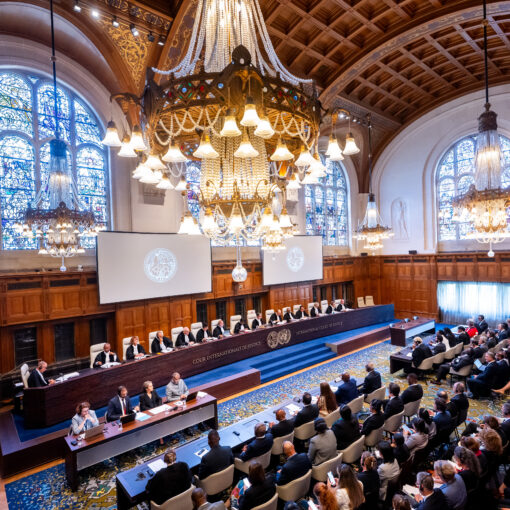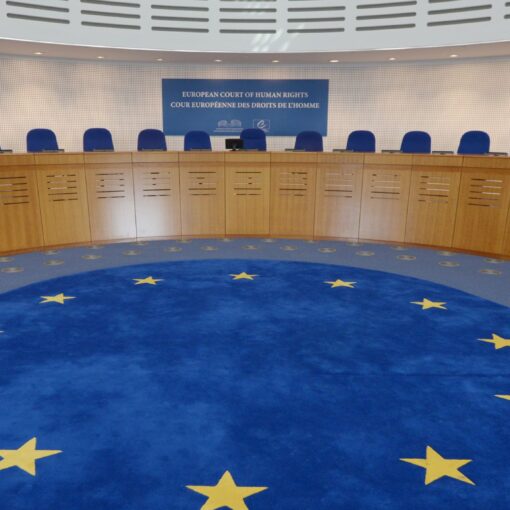
This blog post is Part 3 of a three-part series highlighting the main legal arguments presented during the hearings of the International Court of Justice (ICJ) on the request for an advisory opinion regarding the obligations of States with respect to climate change. Part 1 focused on discussions on applicable law, and the no-harm rule. Part 2 discussed climate change and human rights, the extraterritoriality of climate rights, and State obligations under climate treaties. Part 3 focuses on the legal consequences of causing significant harm and reparations.
Legal Consequences and Reparations
The second question posed by the UNGA concerned the legal consequences for States that have caused significant harm to the climate system through their actions or omissions.
Vanuatu and the Melanesian Spearhead Group (MSG) asserted that these legal consequences ‘are governed by the general law of State responsibility.’ The State emphasized that actions such as granting licenses for fossil fuel exploration and providing subsidies for fossil fuels, as well as omissions like the failure to regulate greenhouse gas emissions, constitute ‘conduct’ attributable to States under Article 42 of the International Law Commission’s Articles on the Responsibility of States for Internationally Wrongful Acts.
Vanuatu further contended that the legal consequences of internationally wrongful conduct are well established. In particular, responsible States must (i) cease the wrongful conduct, (ii) guarantee non-repetition, and (iii) provide full reparations—including compensation, restitution, and satisfaction. States such as Colombia, Jamaica, and Seychelles made similar arguments. Micronesia, Ghana, and Saint Lucia also emphasized that cessation and non-repetition would involve reducing greenhouse gas emissions, cutting fossil fuel subsidies, and phasing out fossil fuels.
In contrast, States such as Japan, Germany, and South Korea emphasized that, while Article 8 of the Paris Agreement recognizes the importance of addressing loss and damage related to the adverse effects of climate change, this provision ‘does not involve or provide a basis for any liability or compensation.’ Others argued that applying the rules of State responsibility in the context of climate change would be particularly complex and uncertain. China argued that ‘loss and damage cannot be addressed through State responsibility or liability regimes’ and that the UNFCCC has already established a ‘special assistance arrangement’ for this issue.
Several States rejected these arguments. For instance, Comoros and Dominica emphasized that the obligation to provide reparations includes compensation for loss and damage. Additionally, States such as Jamaica, Saint Lucia, and Timor-Leste noted that the Loss and Damage Fund cannot replace any compensation obligations resulting from internationally wrongful acts.
Several representatives also argued that applying the rules of State responsibility in the context of climate change would be complex and uncertain. For instance, New Zealand argued that the application of these rules would involve complex ‘unresolved legal and factual issues flowing from the nature of climate change, including those relating to causation and attribution.’ Similarly, Australia and the United States contended that establishing reparations for climate-related harm would be particularly complex, considering it would require a clear causal link between greenhouse gas emissions and the resulting injury.
States such as Barbados, Chile, and Seychelles controverted these arguments. Barbados asserted that ‘each major emitting State individually cannot avoid its obligation to provide redress simply because all the major emitting States acted together.’ According to Barbados, ‘States are liable for common wrongful acts’ and ‘the obligation of redress is joint and several.’ Chile further emphasized that ‘attribution can be established on the basis of accepted scientific consensus, which, in any case, would be a matter for […] contentious proceedings.’ Lastly, Chile argued that courts would be able to consider existing scientific data regarding current and historical emissions from States and their contributions to global warming.
The question of historical emissions and their implications for State responsibility was a topic of significant discussion. Countries including Bolivia, Costa Rica, Kenya, Nepal, South Africa, and Vanuatu and the Melanesian Spearhead Group (MSG) argued that a State’s international responsibility for harm to the climate system can and should be assessed based on both historical and current contributions to greenhouse gas emissions.
For instance, Chile emphasized that science can ‘determine, with incredible precision, current and historic emissions of individual countries and their corresponding contributions to the global mean surface temperature rise.’ According to the State, this data would enable courts to evaluate the sufficiency of climate commitments, assess the extent to which climate change contributes to specific losses and damages, and establish legal implications. In this context, Brazil affirmed that the climate treaties reflect ‘varying historical responsibilities’ and that it is ‘scientifically possible and feasible’ to adopt a methodology to enable State Parties to the climate treaties to quantify their historical responsibility.
In contrast, Germany claimed that ‘the legality of past emissions can only be assessed according to the States’ legal obligations that were applicable at the time.’ The country also noted that the IPCC published its first report in 1990 and that ‘any State practice and opinio iuris can conceivably only have emerged after scientific knowledge about the adverse effects of greenhouse gas emissions had become established.’ Similarly, Russia contended that any legal consequences resulting from violations of climate obligations ‘can only be invoked from the moment the relevant treaties of the UNFCCC system entered into force for that State.’
Russia also asserted that, concerning the customary obligation to prevent significant environmental harm, ‘humanity became sufficiently aware’ of the impact of anthropogenic greenhouse gas emissions in the 1990s. Therefore, according to Russia, ‘a State cannot be held responsible for emissions that occurred before this period.’ The Nordic countries made a similar argument and added that historical responsibilities were explicitly rejected in the Paris Agreement negotiations.
States such as Barbados, Papua New Guinea, Samoa, and Vanuatu questioned these arguments. Barbados stated that it is ‘factually inaccurate’ to claim that States were unaware of the risks associated with greenhouse gas emissions and climate change before the first IPCC report was published in 1990. Barbados identified key dates indicating that States were aware of these risks as early as 1962. Similarly, Samoa argued that States had knowledge about climate change ‘well before the UNFCCC and the Paris Agreement’ and that rules and principles of general international law were applicable before the entry into force of these treaties. Papua New Guinea reached a similar conclusion and emphasized that States have also been ‘bound by the obligation to respect the right to self-determination since at least 1960.’
Concluding Thoughts
The Court has begun its deliberation and is expected to issue an opinion in 2025. The ICJ’s advisory opinion will likely be the third of the trio of advisory opinions on climate change to be published. The International Tribunal for the Law of the Seas (ITLOS) published its advisory opinion in May 2024. The advisory opinion from the Inter-American Court of Human Rights is expected in the next few months. While it is probable that the ICJ will not address all the topics raised in the written submissions by States, it is expected that the advisory opinion will advance significantly international climate law, hopefully in harmony rather than competition with the other two advisory opinions.






